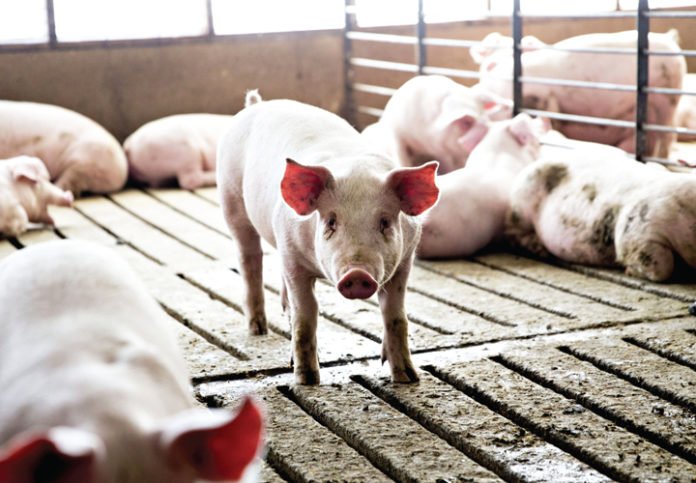THE National Economic and Development Authority (Neda) maintained on Thursday that the reduction in pork tariffs and the increase in the minimum access volume (MAV) will not “kill” the local hog industry.
In a presentation at the Senate Committee of the Whole, Acting Socioeconomic Planning Secretary Karl Kendrick T. Chua said the temporary reduction in pork tariffs aims to reduce pork prices.
Chua added that the increase in MAV will help augment pork supply. The MAV was increased to 404,000 metric tons from 54,000 metric tons, which is consistent with the supply deficit of pork carcass estimated by Neda at 477,000 metric tons this year.
“The temporary increase in pork imports will not “kill” the local hog industry, as imports would potentially account for up to 22.8 percent of total consumption,” Chua said.
“Also, as mentioned by some experts, imports will not flood our markets since ASF [African swine fever] has also affected hog production of many countries,” he added.
Chua said temporarily reducing pork import tariffs to 5 to 10 percent will bring down the landed cost of pork to around P251 to P222 per kilo. This will translate to retail prices of P128 to P135 per kilo.
This, he said, is significantly lower than the P252 to P267 per kilo landed cost if tariffs are kept at 30 to 40 percent. Chua said in March and April, the pork price ceiling was at P350 per kilo.
The lower prices and the higher MAV would bring down inflation to around 3.8 percent, well within the Central Bank’s 2- to 4-percent inflation target this year.
Chua estimated that meat prices contributed 1.2 percentage points in inflation. If meat prices are lower and more supply is made available, Neda estimates this cut by 0.8 percentage points the country’s inflation rate.
“We need to help domestic producers recover from ASF. We also need to help 95 million consumers of pork by reducing tariff and increasing the MAV temporarily to help fill the deficit, reduce food prices, and ensure our food supply is adequate and affordable so that we can prevent higher malnutrition and poverty,” Chua said.
Lawmakers vs EO 128
Chua’s presentation notwithstanding, the dominant mood at the second Committee of the Whole hearing on food security on Thursday weighed against the economic managers’ support for the twin moves to cut tariffs while hiking import quotas.
Senate President Vicente Sotto III counted 19 senators from the Majority and Minority supporting the resolution asking President Duterte to recall EO 128 lowering the pork tariff which, if not revokes, is seen to result in P13-billion lost revenue and the “collapse” of the local hog industry.
At least 17 members of the House of Representatives have also authored a House Joint Resolution 37 with a similar call.
Driver of inflation
Chua said meat has become the largest contributor to inflation, surpassing rice’s role in 2018, when the country encountered a rice price crisis.
In 2018, rice contributed as much as 1 percentage point to inflation. Meat at that time only contributed 0.5 percentage points.
However, in March, high meat prices contributed 1.4 percentage points in inflation; and rice, only 0.1 percentage points.
“The large supply deficit has led to a rapid spike in the retail price of pork. In March 2021, Philippine pork prices averaged P288 per kilo or 36 percent higher and reached as high as P327 per kilo in NCR, or 59 percent higher. Before the supply shock, pork prices were relatively stable at around P224 per kilo,” Chua said.
Chua traced the limited supply of meat in the world market to the long list of ASF-infected countries. These includes Germany, one of the primary sources of pork of the Philippines, as well as Cambodia, China, Greece, Hong Kong, Hungary, Indonesia, Laos, Latvia, Moldova, Mongolia, and Myanmar, among others.
The countries that remain ASF-free are Argentina, Australia, Belize, Brazil, Chile, Costa Rica, European Union (with zoning), Guatemala, and the United States, which is also one of the sources of pork imports of the Philippines.
Chua noted that recent studies have shown limited availability of cold-chain facilities in the country, crimping the huge importation since the capacity is estimated at only 400,000 MT, of which only 268,000 MT is allocated for pork.
“Neda supports the temporary increase in the minimum access volume or MAV coupled with lower tariffs to help fill the deficit, reduce food prices, and ensure our food supply is adequate and affordable,” Chua said.
Last week, the House of Representatives asked President Duterte to reconsider his recommendation increasing the MAV for pork by 350,000 metric tons (MT) and retain the existing 40-percent tariff.
Agriculture and Food Committee Chairman Mark Enverga of Quezon said the House sent a letter to the Office of the President, through the Presidential Legislative Liaison Office (PLLO) last March 29.
The letter was signed by Enverga, Speaker Lord Allan Velasco and Committee on Trade and Industry Chairman John Reynald Tiangco of Navotas.
Last March 26, 2021, the Palace submitted a letter to the House of Representatives recommending the increase in the MAV for pork by 350,000 MT.
With Butch Fernandez
Image credits: Daniel Acker/Bloomberg
Read full article on BusinessMirror



